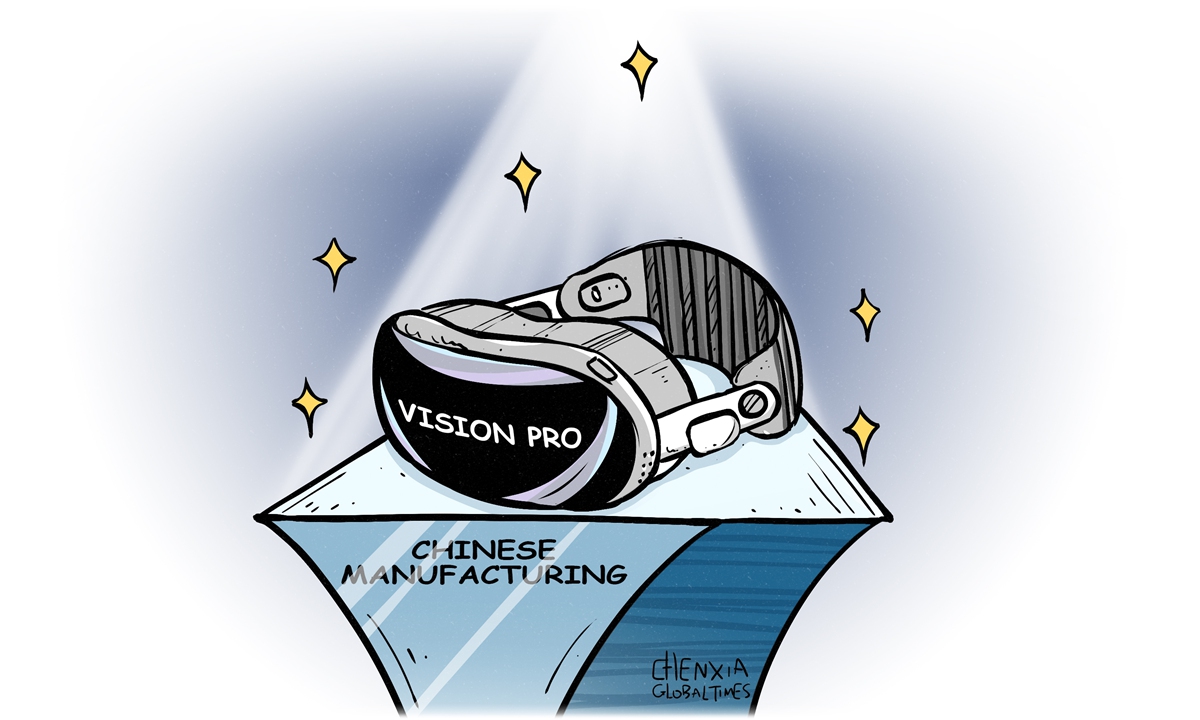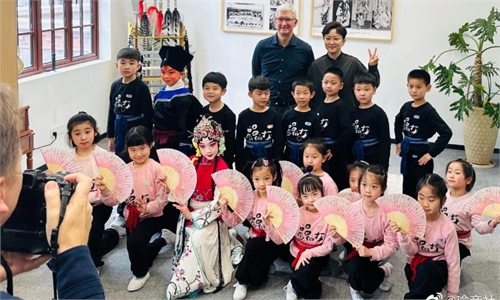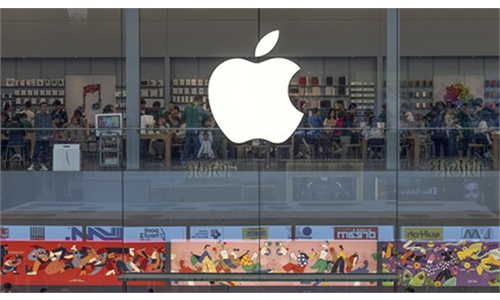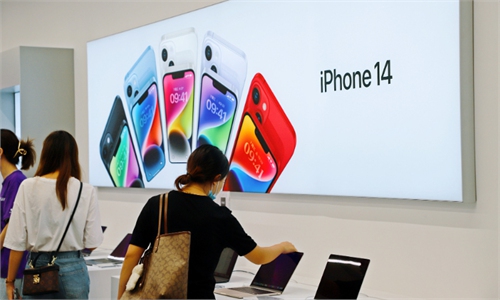
Illustration: Chen Xia/Global Times
Apple has entered the mixed reality game, announcing a long-anticipated new headset, the Vision Pro, on Monday that CEO Tim Cook claimed "seamlessly blends the real world and the virtual world." Some Apple fans believe the era of smart glasses has arrived - and it is an era in which smart glasses will profoundly change our lives, similar to smartphones over the past decade or so.iPhones, to some extent, have built up a unique influence on the era of smartphones. In this process, China has been one of the determinants of iPhones' success, thanks to China's fast-growing consumer market and high-tech manufacturing capability. In turn, iPhones' success has also created employment opportunities across the local labor market. China has been a processing base for Apple and countless local companies have been included into its production chain to provide parts and components or assemble its products. It is difficult to accurately estimate how many people are working for Apple-related jobs, directly or indirectly.
Such cooperation is built on the basis of mutual achievement. If positive interaction can be further strengthened in the new era of smart glasses, rather than being disturbed by US' domestic politics and geopolitical factors, then it will at least be beneficial to the development of the US tech giant, and its Vision Pro.
The Vision Pro heralds the beginning of a new generation in personal technology, Cook said at the company's annual WWDC showcase, the Washington Post reported. "Strap it on, and you'll see virtual worlds on a high-resolution screen that sits right next to your eyes." The Vision Pro is reportedly the most complicated hardware product ever made by Apple, with unusual designs that have proven to be an unprecedentedly challenging to manufacture.
At a time when the iPhone maker plans to boost production in India and other Asian countries, some industry media reports hinted that the Vision Pro will be assembled by China-based companies. No matter whether the information is accurate or not, mixed reality concept stocks strengthened in the past few trading days.
Buoyed up by the news of the debut of Apple's Vision Pro, mixed reality shares in A-share market surged in recent trading. For instance, Wuxi Double Elephant Micro Fibre Material Co surged 32 percent in the week from May 29 to June 2. Hangzhou MDK Opto Electronic rose more than 13 percent and Changying Precision rose 9.5 percent during the same period.
Currently, China has become an important player in relevant areas including mixed reality, virtual reality and augmented reality, which have been widely used in industries both for business and consumers. In 2022, China released an action plan dedicated to virtual reality, with an aim to bring the country's virtual reality industry production to a combined 350 billion yuan ($48.20 billion) in market scale by 2026, while developing 100 leading virtual reality enterprises by that year.
If Apple can use China's manufacturing advantages well and cooperate with China's virtual reality supply chain, its competitiveness in the so-called new era of smart glasses will be enhanced; otherwise, the California-based tech giant will face fierce competition from Chinese competitors.
Just several days before Apple's WWDC showcase, Chinese electronics giant Oppo debuted a mixed reality headset, the OPPO MR Glass Developer Edition. This mixed reality device is equipped with the latest technology inside and out, offering an ideal environment for advanced developers to create and showcase exciting mixed reality experiences. Currently, mixed reality is an area that technology giants are focused on because of this potential. Apple cannot guarantee its Vision Pro will win the competition. Cooperation is the most feasible option for the US tech giant.
It's in this spirit of cooperation that US high-tech companies can boost their competitiveness, achieve sustained growth and win the global competition, but politicians in Washington don't understand this. They want to "de-risk" and diversify US relationship with China, although the efforts of "decoupling" from China have already made US high-tech companies big victims. In response to Washington's economic "decoupling" push, as long as China adheres to technological innovation, continuously develops high-end industries, and enhances its technological and manufacturing strength, such efforts will help achieve good results.
The author is a reporter with the Global Times. bizopinion@globaltimes.com.cn



